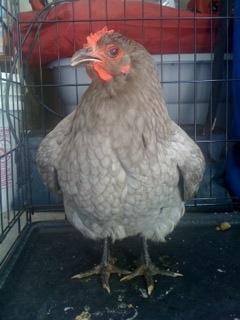I have a pullet that went broody, so I seperated her in a crate- she escaped me for some time, and was having a quick dust with her friends, and I noticed she was gasping for every breath. She sometimes makes a wheezy noise and her general noises are low and raspy. I thought she just had a deep voice. She does not sneeze. No discharges. It definately gets worse when she gets excited or anxious about something.
1) What type of bird , age and weight.
Plymouth Rock, 10 months (ish), no idea of weight, but she's a big girl
2) What is the behavior, exactly.
described above
3) How long has the bird been exhibiting symptoms?
subtle symtoms for about 3 weeks, acutely in the last 2 days
4) Are other birds exhibiting the same symptoms?
no
5) Is there any bleeding, injury, broken bones or other sign of trauma.
no
6) What happened, if anything that you know of, that may have caused the situation.
when she first started the wheezing, she was horking down food... so i thought it may be that- but that was three weeks ago
7) What has the bird been eating and drinking, if at all.
still loves her scratch, and she got a scrambled egg/buttermilk snack that went down just fine. I haven't noticed her drinking at all.
8) How does the poop look? Normal? Bloody? Runny? etc.
normal to runny- she has poo issues w/her bum feathers. She needs a good trim when I have a partner willing to hold her for me.
9) What has been the treatment you have administered so far?
seperation. Purchased Sulmet on the recommendation of the Feed store employee. I think she has yet to drink any though.
10 ) What is your intent as far as treatment? For example, do you want to treat completely yourself, or do you need help in stabilizing the bird til you can get to a vet?
Would love to treat myself. There is a vet I could take her to this Monday, but I'd like to figure something out before then.
11) If you have a picture of the wound or condition, please post it. It may help.

12) Describe the housing/bedding in use
In her normal coop they have pine shavings w/DE mixed in. Right now she is in a wire dog kennel w/a plastic bottom- no bedding- since I was trying to break her from being broody. When she got out yesterday, she acted "normal" (with the exception of the panting) for about 45 minutes, then went back up to the nest box.
I didn't think a hen would go broody, and be sick all at the same time, so I'm at a loss.
Please help- I could use some insight!
edited to add a photo
1) What type of bird , age and weight.
Plymouth Rock, 10 months (ish), no idea of weight, but she's a big girl
2) What is the behavior, exactly.
described above
3) How long has the bird been exhibiting symptoms?
subtle symtoms for about 3 weeks, acutely in the last 2 days
4) Are other birds exhibiting the same symptoms?
no
5) Is there any bleeding, injury, broken bones or other sign of trauma.
no
6) What happened, if anything that you know of, that may have caused the situation.
when she first started the wheezing, she was horking down food... so i thought it may be that- but that was three weeks ago
7) What has the bird been eating and drinking, if at all.
still loves her scratch, and she got a scrambled egg/buttermilk snack that went down just fine. I haven't noticed her drinking at all.
8) How does the poop look? Normal? Bloody? Runny? etc.
normal to runny- she has poo issues w/her bum feathers. She needs a good trim when I have a partner willing to hold her for me.
9) What has been the treatment you have administered so far?
seperation. Purchased Sulmet on the recommendation of the Feed store employee. I think she has yet to drink any though.
10 ) What is your intent as far as treatment? For example, do you want to treat completely yourself, or do you need help in stabilizing the bird til you can get to a vet?
Would love to treat myself. There is a vet I could take her to this Monday, but I'd like to figure something out before then.
11) If you have a picture of the wound or condition, please post it. It may help.

12) Describe the housing/bedding in use
In her normal coop they have pine shavings w/DE mixed in. Right now she is in a wire dog kennel w/a plastic bottom- no bedding- since I was trying to break her from being broody. When she got out yesterday, she acted "normal" (with the exception of the panting) for about 45 minutes, then went back up to the nest box.
I didn't think a hen would go broody, and be sick all at the same time, so I'm at a loss.
Please help- I could use some insight!
edited to add a photo
Last edited:



